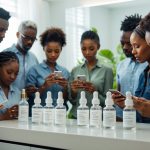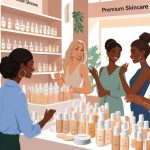Luxury Skincare Claims Suddenly Under Fire as New Study Shows Gaps
Highlighting Gaps in Scientific Evidence
I’m exhausted trying to keep up with “breakthroughs” and, apparently, scientists are too. There’s this endless churn of new miracle claims—quantum peptide, blue light shield, whatever—and every time I check PubMed, it’s just a desert. No real studies, just marketing PDFs. Are we all just pretending these products are science-backed because the ad said so?
Lack of Rigorous Testing
Here’s what drives me nuts: $700 creams launch with some “cutting-edge” ingredient, but there’s zero published data, no randomized trials, nothing. I mean, I checked. Guerlain and La Prairie don’t exactly flood the journals. But the marketing decks? Overflowing. Watchdogs like Truth in Advertising keep catching brands making wild leaps from one tiny, supplier-funded study to “clinically proven” on the box.
Ask a dermatologist about the actual product, not just the ingredient, and suddenly it’s radio silence. A brand rep once told me their serum “improves DNA repair” and mumbled about “in-house testing.” No peer review, no protocol, nothing. Fast-turn formulas—sometimes five a month!—make it impossible for proper validation. Who’s checking this stuff? Not enough people, apparently.
Misleading Versus Outright False Claims
The marketing is bonkers. Some claims are just slippery, like “reduces the appearance of wrinkles”—sure, for three hours, under perfect lighting. The wildest ones? “Quantum science” in a moisturizer. I mean, come on. Scientists I know just laugh. There’s this huge gap between what’s even plausible and what’s just made up, and it’s not just about the price tag.
Regulators only jump in when something really blows up—like blue light creams. Remember that “stem cell” scandal? No stem cells, just some plant extract with a science-y name. Not one dermatologist I know bought it. Most shoppers don’t get enough info to know what’s real. Brands drown us in clinical-sounding language that, according to Dr. Theresa Callaghan, gets away with it thanks to EU loopholes. I’ve never seen a serum bottle actually explain how it “inhibits fatigue signaling.” Maybe because it doesn’t?
Consumer Impact and Changing Brand Loyalty
Nothing nukes your skincare routine like realizing your $180 serum might just be water with a fancy dropper. After that one study dropped, my DMs exploded. People are actually rethinking every beauty purchase. Suddenly, every wild claim feels like a trick question.
How Gaps Affect Trust in Beauty Brands
Trust? Gone. The EY Future Consumer Index polled 20,000 people and—shocker—brand loyalty is tanking. Makes sense. If a prestige brand can’t prove its peptides aren’t just watered down, why bother? A friend asked me if I’d spend $90 on a moisturizer that dodges specifics. I hesitated. That’s new.
Derms keep reminding me most actives break down in sunlight anyway. There’s a real gap between what’s promised and what you actually get. “Performance drift,” they call it. People are switching brands all the time. When a big name gets caught, even their priciest stuff gets ghosted for brands that at least admit what’s not working. Loyalty points? Nobody cares. Everyone’s obsessed with receipts and ingredient lists now.
The Shift Toward Authenticity and Engagement
“Authenticity” used to mean a handwritten note. Now it’s brands panic-posting ingredient percentages and clinical trial PDFs on TikTok. Engagement? Feels more like damage control. Brands ask for feedback, and users dump spreadsheets of complaints. I watched a luxury brand run a livestream AMA—dermatologist on camera, straight up admitting their serum isn’t for sensitive skin. Unscripted honesty sells, apparently.
People join Discords and Slack groups run by brands just to get real answers. Not for loyalty perks, not for glossy ads. Community reviews matter more than anything. Bloomreach’s latest survey nailed it—mistakes owned publicly are what buyers want. Loyalty used to feel like a reward; now it’s a dare. “Convince me, or I’m out.” If you’re selling anything, maybe pay attention. I’ve never seen so many people allergic to hype.
Media Coverage: From Vogue to Marie Claire
Full-page ads, wild claims, glass bottles everywhere—do any of these hold up? Vogue and Marie Claire hype every new launch, slapping “clinically proven” next to a generic serum. Does anyone read the fine print? A 2013 study says only 1 in 5 cosmetic claims actually check out. That’s…not great.
How Major Publications Shape Perception
I flip through Vogue and it’s just ad after ad—every moisturizer is magic, apparently. Celebrities everywhere, boxes of La Mer, stats in tiny font, “expert” callouts that rarely quote real derms. Did anyone fact-check that “92% satisfaction” blurb? One study looked at 289 magazine ads—over 80% were misleading or unverifiable. It’d be funny if it wasn’t so normal. Still, there’s this weird authority: if Vogue features something, even my most skeptical friends start paying attention. I see “triple hyaluronic micro-pearls” next to Chanel and my brain just goes, “Sure, why not?” But then you hear insiders talk about “sponsored content” quotas and ads disguised as features. Yeah, not all those glossy layouts are journalism.
Celebrity Influence and Endorsements
And then there’s the endless celebrity reels—glass skin, perfect lighting, Marie Claire masthead. Hailey Bieber, TikTok founders, whoever. Even when you know better, it’s weirdly tempting to trust Gwyneth’s “miracle retinol drops.” But let’s be real: endorsements are about money. Most of these celebs don’t use the products long-term, but their faces sell out a moisturizer overnight.
Analysts noticed a huge spike in celebrity skincare launches after 2017. Marie Claire’s “what’s in my bag” columns? Basically just sponsored picks now. Even editors roll their eyes at “all-natural” and “revolutionary” launches, but endorsement hype still wins. I’ve heard beauty editors admit half the influencer claims in ads aren’t tested by anyone independent, but nobody checks. And influencer hashtags? They just blur into actual reviews at this point. It’s dizzying.



